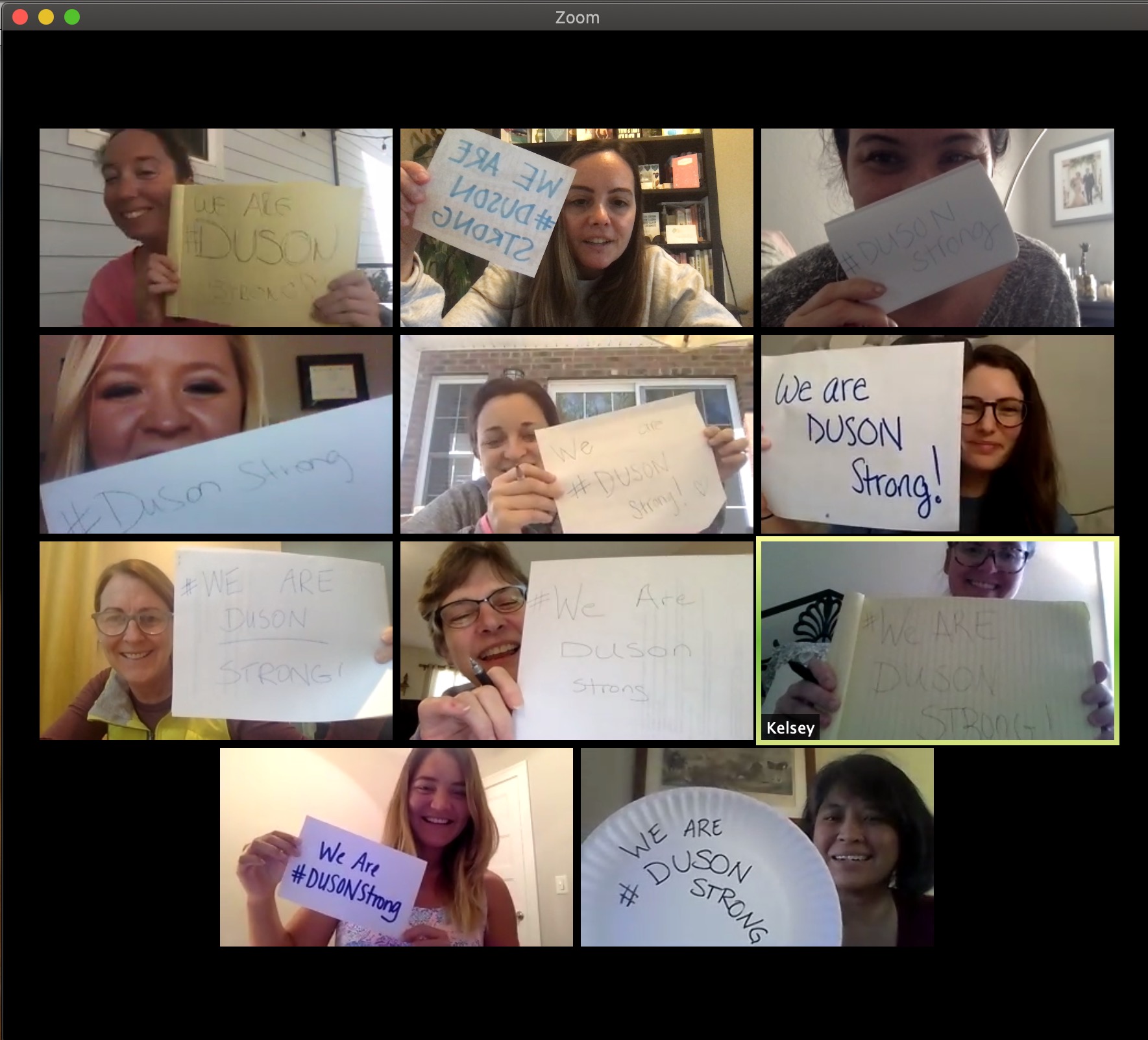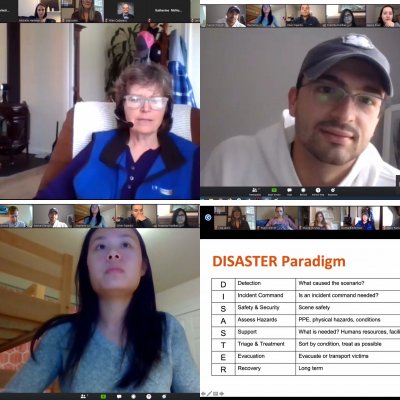Duke’s Distance-Based Expertise, Nimble Faculty and Staff Rise to COVID-19 Challenge

When Duke University School of Nursing (DUSON) ABSN, DNP Nurse Anesthesia and PhD students left campus for spring break on March 6, no one knew of the major pivot that faculty and staff would do in the next few weeks to ensure that their students' education would stay on track and on target.
Fortunately for these students, many of the faculty and staff at DUSON are experts in distance-based education and they used that expertise to shift an entire semester of face to face instruction to an online format in a matter of just two weeks. It was a task that could have overwhelmed most schools, but the DUSON community came together and rose to the challenge.
When students returned on March 23, with the help of Zoom meetings and learning management systems, faculty, staff and students would join our nationally ranked MSN and DNP programs so DUSON's entire 1,100+ student body would be a fully distance-based learning community. Regardless of the challenges they were facing personally and professionally, DUSON faculty and staff ensured that their education was ready to proceed.
In just the first week, fourth semester ABSN students participated in a simulated disaster exercise with seamless results. The first scenario featured a simulated bus accident. Students used virtual breakout rooms to form small groups and assess the situation, supplies and each patient. Faculty moved between each breakout room to check on patients’ status and advise students. Led by ABSN Program Director Michelle Hartman, this  simulation was the first of many for these students, who are preparing for graduation in a few weeks and for sitting for their NCLEX examinations. With an average 99 pecent passing rate on licensing examinations for our ABSN students, and an employment rate of 98 percent within six months of graduation, faculty and staff are even more committed to ensuring that our ABSN students are equipped through creative teaching approaches.
simulation was the first of many for these students, who are preparing for graduation in a few weeks and for sitting for their NCLEX examinations. With an average 99 pecent passing rate on licensing examinations for our ABSN students, and an employment rate of 98 percent within six months of graduation, faculty and staff are even more committed to ensuring that our ABSN students are equipped through creative teaching approaches.
As for PhD students, the pivot to virtual learning came at an intense time, as some were preparing their dissertation defenses. With dissertation presentations already scheduled to take place on campus the last two weeks of March, eight students had to physically and mentally transition and prepare to complete their PhD dissertation defenses virtually. And they did great, with more participants in their virtual audience than ever before.
While the short turnaround time for the change was unexpected, those who attended the virtual defenses exceeded the typical turnout and totaled more than 100 from all over the country in the first week.
“I heard that our defenses would be moved online less than one day beforehand and I thought everyone would be panicked,” said Eunji Cho, PhD student and the first student to present online. “But in reality everyone was so calm, delightful and supportive. I started by saying, ‘Welcome to my cyber presentation,’ and it made people laugh.” Cho says she feels even more connected with other people now, after doing her dissertation defense online.
This new virtual environment is supported by our Information Technology team and staff assistants who in the first two weeks of the transition provided more than 160 hours of direct classroom support resources in addition to their regular duties.
While the virtual learning environment isn’t new for our leading MSN and DNP Programs, some courses did require adjustments because of COVID-19. With the number of cases increasing across the country, health systems have had to adjust their visitor policies including students completing their clinical placements. These changes meant some of our nurse practitioner students had to gradually step away from their clinical sites.
 Faculty such as Kathryn Trotter, associate professor and lead faculty for the Women’s Health Nurse Practitioner major, stepped in and adjusted one of her courses by adding table top simulation case presentations. “Our nurse practitioner students need clinical hours and we can conduct simulations to help them earn some of these hours,” says Trotter. “This is somewhat uncharted territory and Duke is ready to lead to solve this very real dilemma about earning clinical hours.”
Faculty such as Kathryn Trotter, associate professor and lead faculty for the Women’s Health Nurse Practitioner major, stepped in and adjusted one of her courses by adding table top simulation case presentations. “Our nurse practitioner students need clinical hours and we can conduct simulations to help them earn some of these hours,” says Trotter. “This is somewhat uncharted territory and Duke is ready to lead to solve this very real dilemma about earning clinical hours.”
In Trotter’s simulations, students work through active cases virtually. The students present their cases and works as a team to think about further assessments, differentials, plans of care, including sensitivity to cultural backgrounds, and even thinking about access to technology by patient-teaching tools as well as telehealth visits. “This type of teaching speaks to our nurse practitioner core competencies of leadership, technology and information literacy, and independent practice inquiry,” says Trotter.
Chelsie Mattox is a second year Women’s Health Nurse Practitioner student that found the simulations helpful. “Reviewing cases even one including a COVID-19 care in pregnancy with recommendations that were just hours old, was extremely helpful and I’m excited for upcoming classes.”
Trotter, who is also active in clinical practice, is expanding the reach for her students by allowing them to sit in with her as she conducts telehealth visits with patients virtually.
For those of you who will join us this fall, thank you for your noble choice. Whether it’s your first step in your nursing journey, or beginning to earn your advanced degree, you’ll find a home at Duke.